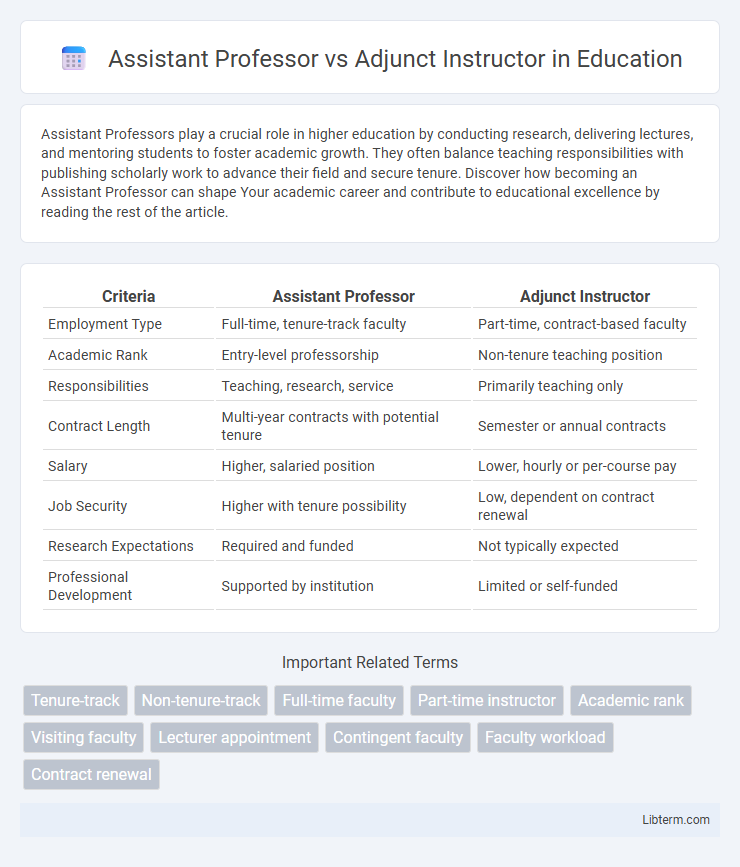Assistant Professors play a crucial role in higher education by conducting research, delivering lectures, and mentoring students to foster academic growth. They often balance teaching responsibilities with publishing scholarly work to advance their field and secure tenure. Discover how becoming an Assistant Professor can shape Your academic career and contribute to educational excellence by reading the rest of the article.
Table of Comparison
| Criteria | Assistant Professor | Adjunct Instructor |
|---|---|---|
| Employment Type | Full-time, tenure-track faculty | Part-time, contract-based faculty |
| Academic Rank | Entry-level professorship | Non-tenure teaching position |
| Responsibilities | Teaching, research, service | Primarily teaching only |
| Contract Length | Multi-year contracts with potential tenure | Semester or annual contracts |
| Salary | Higher, salaried position | Lower, hourly or per-course pay |
| Job Security | Higher with tenure possibility | Low, dependent on contract renewal |
| Research Expectations | Required and funded | Not typically expected |
| Professional Development | Supported by institution | Limited or self-funded |
Introduction: Understanding Academic Roles
Assistant Professors hold tenure-track positions with responsibilities in teaching, research, and service, often aiming for long-term academic career advancement. Adjunct Instructors typically serve on a part-time, contract basis primarily focused on teaching without research obligations or job security. Differentiating these roles clarifies faculty expectations, career paths, and institutional commitments within academia.
Definition: Assistant Professor
An Assistant Professor is a tenure-track faculty member at a university or college, responsible for teaching, research, and service duties. This position typically requires a doctoral degree and involves a probationary period before possible promotion to Associate Professor. Assistant Professors contribute to academic scholarship while developing their teaching portfolio and securing funding for research projects.
Definition: Adjunct Instructor
An Adjunct Instructor is a part-time faculty member contracted to teach specific courses without tenure or long-term commitments, often balancing multiple teaching roles across institutions. This position emphasizes flexibility and specialized expertise, typically without responsibilities in research or full faculty governance. Unlike Assistant Professors, Adjunct Instructors usually receive lower pay and fewer benefits while focusing primarily on instructional duties.
Key Differences in Job Responsibilities
Assistant Professors typically engage in research, curriculum development, and hold tenure-track positions with greater job security, while Adjunct Instructors primarily focus on teaching responsibilities without research obligations and often work on a contractual, part-time basis. Assistant Professors contribute to academic governance and student mentorship, whereas Adjunct Instructors deliver specific course content with limited involvement in departmental duties. The distinction in workload and institutional commitment is central to understanding the key differences in job responsibilities between these academic roles.
Education and Qualification Requirements
Assistant Professors typically require a doctoral degree, such as a Ph.D., in their field, alongside a strong record of research, publications, and teaching experience. Adjunct Instructors often need at least a master's degree, with significant professional expertise or teaching experience, but usually do not require extensive research credentials. The educational qualifications for Assistant Professors reflect their tenure-track roles and academic responsibilities, while Adjunct Instructors are generally part-time, contract-based educators with a focus on practical knowledge.
Employment Status and Contract Terms
Assistant Professors typically hold full-time, tenure-track or tenure positions with multi-year contracts and job security, often including benefits like health insurance and retirement plans. Adjunct Instructors are generally part-time employees hired on short-term, semester-based contracts without job security or comprehensive benefits. Employment status for Assistant Professors reflects a long-term commitment to the institution, while Adjunct Instructors work on contingent terms with limited organizational integration.
Salary and Benefits Comparison
Assistant Professors typically receive higher salaries than Adjunct Instructors, reflecting their full-time status and tenure-track responsibilities. Benefits such as health insurance, retirement plans, and paid leave are commonly provided to Assistant Professors but are often limited or unavailable to Adjunct Instructors due to their part-time, contractual roles. The disparity in compensation and benefits highlights the fundamental employment differences between these academic positions.
Career Advancement Opportunities
Assistant Professors typically have greater career advancement opportunities due to their tenure-track status, which provides a path to associate and full professorships, along with increased research funding and leadership roles. Adjunct Instructors usually hold part-time, non-tenure positions with limited access to institutional resources, minimal job security, and fewer opportunities for promotion. Career progression for adjuncts often depends on external teaching experience rather than internal academic achievements.
Workload and Work-Life Balance
Assistant Professors typically manage a higher workload involving research, teaching, and service responsibilities, often leading to extended working hours and increased stress. Adjunct Instructors usually have fewer institutional obligations and teach fewer courses, allowing for greater flexibility and better work-life balance. However, adjunct roles often lack job security and benefits, which can affect overall work stability and well-being.
Choosing the Right Role: Which is Best for You?
Evaluating the roles of Assistant Professor and Adjunct Instructor involves considering factors such as job security, teaching load, and career goals. Assistant Professors typically hold tenure-track positions with opportunities for research and long-term advancement, while Adjunct Instructors often have part-time contracts focused solely on teaching without guarantees of permanence. Choosing the right role depends on your priorities for stability, professional growth, and work-life balance within academia.
Assistant Professor Infographic

 libterm.com
libterm.com